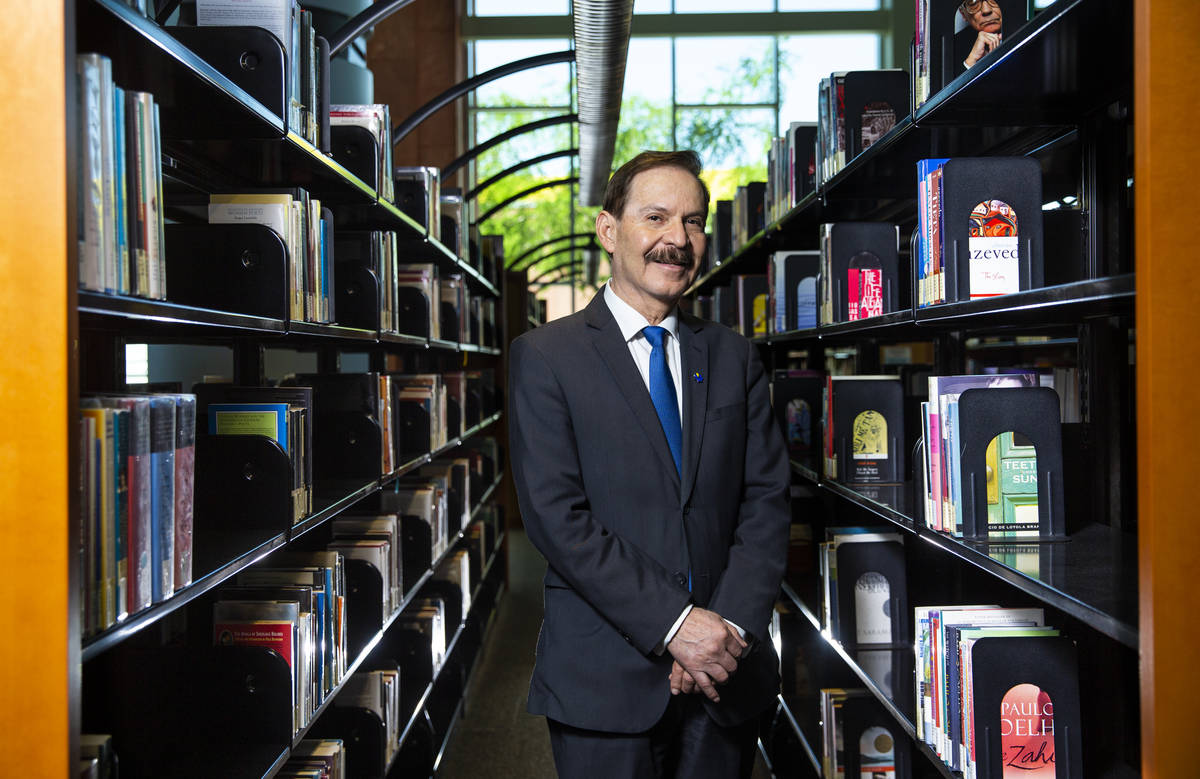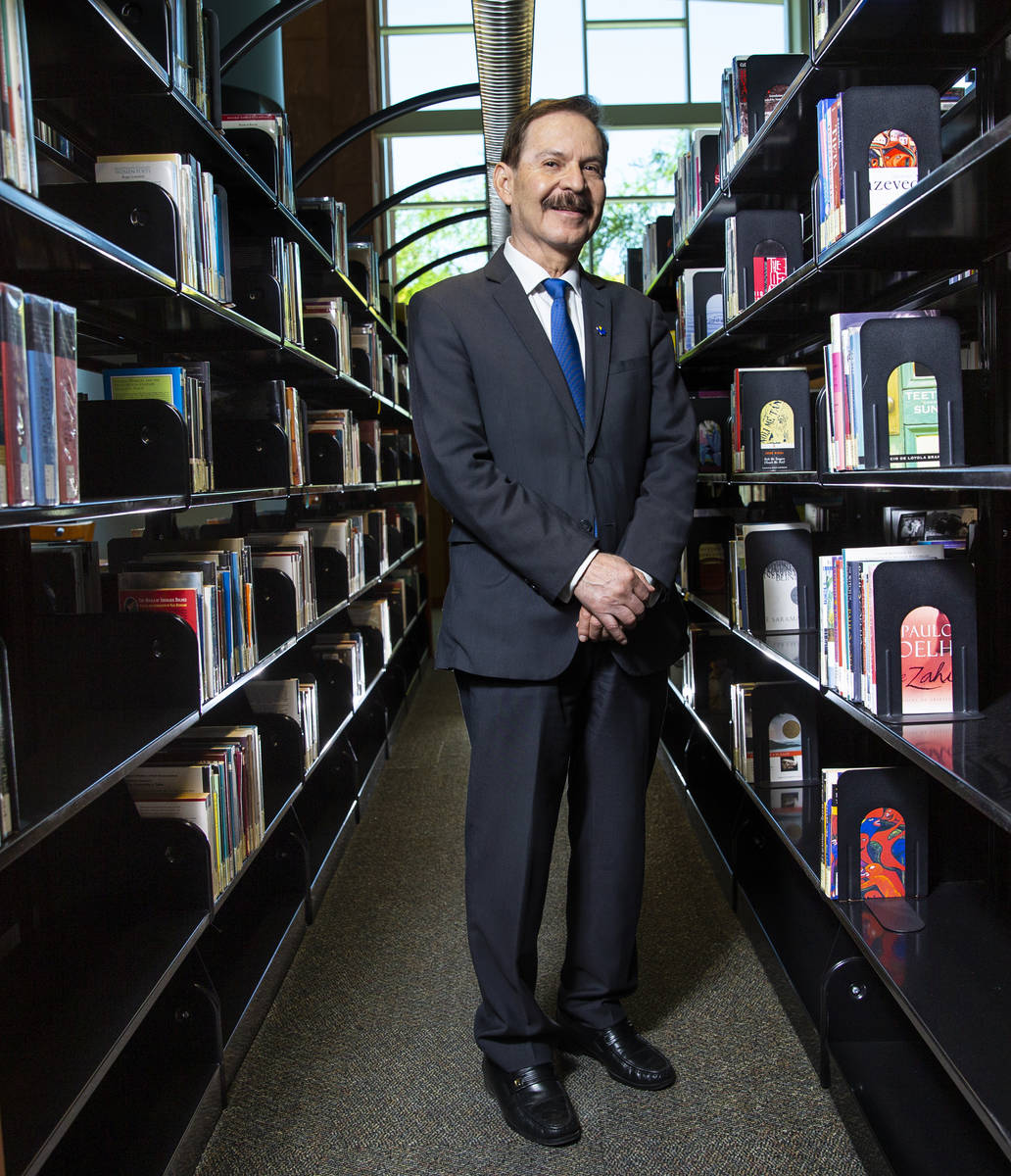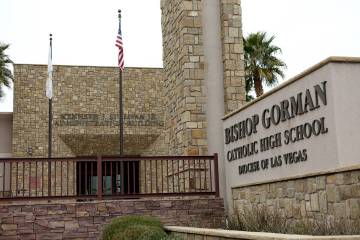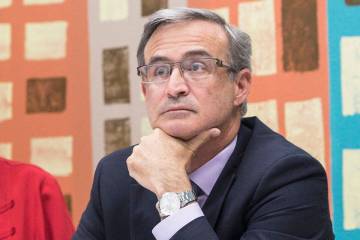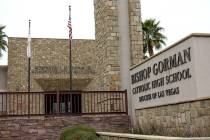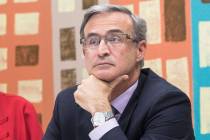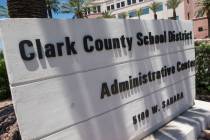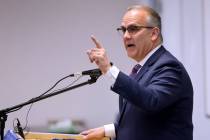How Biden’s free community college proposal could impact Nevada
Cecilia Belio is almost done with her associate’s degree and hasn’t taken out any student loans so far to pay for college.
That’s because the 20-year-old College of Southern Nevada student is receiving a couple of state scholarships, including the Nevada Promise Scholarship, which covers community college tuition and mandatory fees for up to three years.
Nevada is among more than a dozen states with a promise scholarship program that helps eligible students pay for community college tuition. Now, a new national proposal calls for two years of tuition-free community college for millions of Americans, although implementing it could come with some hurdles for schools.
Under President Joe Biden’s American Families Plan, announced in late April, an estimated $109 billion would be used to fund universal community college as part of a $1.8 trillion plan that also includes two years of universal preschool and child care tax credits.
Belio said she doesn’t know the full details of Biden’s plan, but “I really like that he’s wanting to invest in community colleges.”
College of Southern Nevada President Federico Zaragoza said he gets excited by the possibility and policy implications of the national community college proposal but hasn’t seen an actual plan.
It’s unclear what the eligibility criteria would be, Zaragoza said. “The devil is always in the details.”
And if the proposal becomes a reality, CSN would “really have to change the ways we do things,” he said.
But, Zaragoza said, it could be a game-changer.
Big market in Nevada
Nevada is home to four community colleges: CSN — with about 30,000 students and three Las Vegas Valley campuses — Truckee Meadows Community College in Reno, Western Nevada College in Carson City and Great Basin College in Elko.
The three Northern Nevada community colleges declined to comment on how they could be affected by Biden’s proposal and referred the Review-Journal to the Nevada System of Higher Education — which oversees all universities and community colleges in the state — for more information.
Biden’s proposal comes as Nevada’s higher education system — and many others across the nation — have seen student numbers drop during the COVID-19 pandemic. Community colleges have generally been hit the hardest.
The system had 100,062 students enrolled in all colleges and universities this spring, according to a preliminary enrollment report. That’s down 5 percent, or nearly 5,000 students, compared with the spring 2020 semester.
CSN had 29,170 students this spring — down 13 percent compared with a year ago. Nevada’s three other community colleges saw enrollment drops this semester ranging from 7 to 12 percent.
Higher education Chancellor Melody Rose said she appreciates Biden’s proposal, and it would especially help low-income and first-generation college students access higher education.
“In general, anything we can do to remove a barrier to entry for our community colleges would be received as a good thing,” she said.
That’s especially true now when colleges are trying to support displaced workers because of the COVID-19 pandemic, Rose said, noting community colleges play a critical role in revitalizing the state’s economy.
As for the potential impact on the state’s four-year schools, Rose said that doesn’t concern her. Enrollment is “very stable” at UNLV and University of Nevada, Reno, and Nevada State College in Henderson has quickly-growing student numbers, she said.
Lots of unknowns
There’s still many unanswered questions about Biden’s proposal. That includes how the federal program would intersect with state-level programs like the Nevada Promise Scholarship, Rose said.
And the proposal, she said, could be amended in the congressional process.
For potential community college students, not having to worry about tuition will create a college-going culture and people will be able to see higher education as a viable pathway, Zaragoza said.
To create pathways to the middle class and prosperity, “higher education is almost always a prerequisite,” he said.
But Zaragoza also asked questions about Biden’s proposal: Will there be requirements for states to maintain their promise scholarship programs? And would the national program be a “first-dollar scholarship” where 100 percent of tuition is covered or, like the Nevada Promise Scholarship, “is it a last-dollar scholarship that says students have to exhaust all other resources before they are eligible?”
Obligations for schools
An expansion in student numbers at CSN would require more faculty and support systems, Zaragoza said. “That would take, obviously, an investment. That’s where funding becomes very important.”
Zaragoza said he doesn’t want to think of it as a “brick-and-mortar question only” but noted that available space is a consideration. He said the college has the infrastructure “to significantly meet the demand that would emerge.”
The college’s maximum capacity with its current schedule is about 100,000 students, Zaragoza said, adding, “We have some growth capacity.”
Many students would also have the option of pursuing their education via online classes, he said. “That’s a component that could grow significantly.”
The college offered about 30 percent of its classes online pre-COVID-19. And since March 2020, the majority of classes have been in a remote format in response to the pandemic.
One of the major challenges that could come with an influx of students: Some of the college’s programs such as nursing and other health science areas already have waiting lists, and “these gaps would only intensify,” Zaragoza said.
Other growing program areas such as manufacturing typically require more space and a different kind of equipment, he said.
Finding additional qualified educators would also be a hurdle, Zaragoza said, noting it’s difficult and extremely competitive already in some areas such as master’s-degree level nursing instructors.
The same issues would also be felt in industry-specific programs where there are limited candidate pools and the college struggles to compete with the private sector, he said.
Nevada is a growing state and has accommodated an influx of students before, such as during the economic recession more than a decade ago. But the state would need to do multi-year forecasting of the enrollment implications of the federal community college proposal, Rose said.
There’s also a need to anticipate what high-demand programs will be, she said, and if there’s facility space to accommodate more students.
As for staffing, colleges and universities in a high growth period often bring in subject matter experts from the community initially as adjunct faculty, and once enrollment has stabilized and becomes predictable, schools add more full-time positions, Rose said.
“That’s often how we deal with a quick increase in enrollment or a quick scaling opportunity,” she said.
Support in Congress
Rep. Dina Titus, a Las Vegas Democrat and a retired UNLV professor of more than 30 years, supports the Biden plan’s broad proposals.
“I’m excited about it,” Titus said. “I spent my career teaching, and I know that education is what provides you a path to the middle class and helps you stay there. It used to be a high school diploma, but now you need the two years of college to get there.”
Titus noted that, with free community college, the plan would provide millions in funding to universities that serve minority communities, including Nevada’s. The plan also includes Deferred Action for Childhood Arrival recipients, which she said was incredibly important.
She stressed taxes would not increase for anyone making less than $400,000 under Biden’s various plans, and the capital gains and dividends taxes would only affect corporation heads “who don’t pay their fair share anyway.”
“People at the top of those companies have actually made money during this pandemic, and they’ll make more when we provide them with skilled, educated workers,” Titus said.
Congress remains focused on passing Biden’s even larger infrastructure bill, but the Families Plan should be taken up by the end of the year, Titus said.
“You either go big, go bold or go back home,” she added. “This is a chance for transformative legislation.”
Skeptics raise questions
Titus’ longtime colleague up north, Republican Rep. Mark Amodei, is far less enthusiastic.
“I have a concern with this continued march we are doing toward stuff that costs a whole lot of money and allows the federal government to take it over,” Amodei said.
The congressman said he does not see a demand for universal community college in Nevada, which has prioritized higher education and offers various avenues through college such as the millennium scholarship.
There are too many questions and variables, he added.
Will the higher education system need to hire more people? Can they hire more, given the demand for teachers? Do we need new campuses? Is there a GPA or other requirements, and if so, will the federal government be enforcing standards or will the state? Is the $109 billion nationwide for tuition, or does it also cover lodging and materials?
Amodei criticized the proposal’s funding source, saying the taxes proposed have also been earmarked to pay for other programs. He was also skeptical of a plan to modernize the Internal Revenue Service, and thus collect more unpaid taxes, as a way to pay for anything.
“I’ve been around long enough to see how many times uncollected taxes have been used by both sides as a way to pay for their plans, and, respectfully, I say that’s BS.”
Amodei said he could support a more targeted approach — free tuition for students going into a sector of high need, such as tech work or the building trades.
Other concerns
Scott Hammond, a Republican state senator and former teacher and college professor working with the Nevada Contractors Association on high school trade programs, agreed with many of Amodei’s points.
Hammond noted that tuition has risen steadily over the past decade as more and more Americans have attended college. If Biden’s plan leads to a massive surge in enrollment, costs probably will increase for all students as a matter of supply and demand.
“We in the state of Nevada over the last 10 years have taken a lot of time trying to find ways to open up access to higher education to those communities and groups that have been traditionally left out,” Hammond said.
“My concern is that when you make it completely accessible, then you have folks who are going to go not because they’re ready or even want to go to college,” he continued. “We could disproportionately allocate resources to something that’s not going to really benefit the community.”
What is the Nevada Promise Scholarship?
Some Nevada students are already the recipients of a state scholarship that covers remaining tuition costs after other gift aid is applied.
The Nevada Promise Scholarship — created by the Legislature in 2017 — is modeled after Tennessee Promise, the nation’s first free community college program.
The scholarship has only been in effect for a couple of years, but “utilization of the program has grown significantly in its short life,” Rose said.
This school year, 2,330 students across Nevada’s four community colleges received the scholarship and approximately $3.1 million was awarded, according to the system’s data. That’s up from 812 recipients who received about $1.7 million in assistance during the 2018-19 school year.
The scholarship is for full-time, degree-seeking students. Those who receive it must fulfill requirements such as meeting with a mentor and completing eight hours of community service each semester.
The Nevada Promise Scholarship is a “last-dollar scholarship” and applicants must fill out the Federal Application for Free Student Aid (FAFSA). “They would then be eligible for the Promise Scholarship after they have exhausted all other resources,” Zaragoza said. “So oftentimes, it’s gap funding, if you will, for higher education.”
A handful of other states, including California and Oregon, also have some version of a promise scholarship. And New York’s Excelsior Scholarship allows recipients, who have an income of up to $125,000 per year, to attend the state’s public colleges tuition free.
The Nevada Promise Scholarship, and most promise scholarships nationwide, target recent high school graduates, Zaragoza said.
At CSN, 1,120 students received the scholarship this school year and nearly $1.5 million was awarded, according to NSHE.
The average award at CSN is about $1,000 per year, Zaragoza said. The college’s in-state tuition and fees this school year for full-time students was $3,361.
Statewide, there was about $2.8 million in the promise scholarship account just before the fall 2020 semester began. It wasn’t enough to cover all of the eligible students, so the four community colleges used their own funds to cover about $350,000 in awards.
State funding for the scholarship is allocated for the two-year biennium, but funding can be rolled over to the next two-year cycle. For the current fiscal year, the scholarship took a $1.1 million cut in state funding.
In total, the state received 13,702 applications by a late October 2019 deadline from high school seniors graduating in the class of 2020, according to the higher education system. Of those, 9,901 applicants were for CSN.
Belio has received the Nevada Promise Scholarship for two years and combined with the state’s Governor Guinn Millennium Scholarship, it covers all her CSN tuition costs.
“If you have other scholarships, those go in first,” she said, noting the Nevada Promise Scholarship essentially pays the rest off.
Belio is one class away from earning an associate’s degree in business management and hopes to finish this summer. Then, she wants to start this fall in the college’s bachelor’s degree program in project management.
Belio said the Nevada Promise Scholarship has helped her significantly because she’s not eligible for the federal Pell Grant, which provides needs-based aid to low-income students.
The Desert Pines High School alumna said she’s thankful her high school teachers encouraged students to apply for the Nevada Promise Scholarship.
As part of the scholarship requirements, she meets with her assigned mentor, which she said has been extremely helpful.
Students must also remain in good academic standing.
“That’s pretty easy for me,” Belio said. “I don’t really have to worry about that.”
Contact Julie Wootton-Greener at jgreener@reviewjournal.com or 702-387-2921. Follow @julieswootton on Twitter. Contact Rory Appleton at rappleton@reviewjournal.com or 702-383-0276. Follow @RoryDoesPhonics on Twitter.



